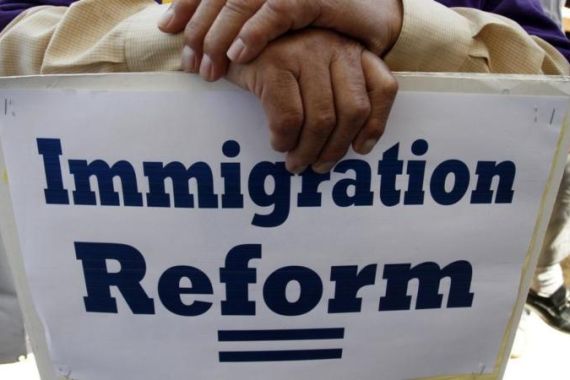Don’t get fooled again on US immigration reform
Despite the apparent support for reform, the new immigration deal may “fall apart once again, just as in the past”.

Meet the new bill… Same as the old bill?
In 2007, comprehensive reform of America’s troubled immigration system seemed about to happen at long last. After all, the Secure Borders, Economic Opportunity and Immigration Reform Act, crafted by a bipartisan team of legislators known as the “Gang of 12” and sponsored by Senate Majority Leader Harry Reid, was backed by then-President George Bush as well as the leaders of both major political parties in both houses of Congress. What could possibly go wrong?
Six years later, the answer is obvious. Far right-wing elements of the Republican party, coupled with conservative radio talk show hosts led by Rush Limbaugh, cynically re-framed the complicated legislation as simply providing amnesty – or “shamnesty” for “illegal immigrants”, as they cleverly re-branded it the proposed bill.
But opponents to reform did not stop there. Ratcheting up the rhetoric, Limbaugh warned on his nationally syndicated radio programme that Mexican immigrants who illegally entered the US were not only “poor and unwilling to work”, but also “a renegade, potential criminal element”. Fellow shock jock Michael Savage went further, vowing to “derail this train of treason” and urging his listeners to “stop Bush from dropping the ‘I Bomb’ on America”. Bill O’Reilly, another top-rated talker, said supporters of immigration reform “hate America, and they hate it because it’s run primarily by white Christian men”. O’Reilly added, “There is a movement in this country to wipe out ‘white privilege’ and to have the browning of America.”
The hate speech, exaggeration and demagoguery did not end there, however. Even as some Republican lawmakers tried their best to placate the shock jocks, even to the point of accepting their ideas for amendments to the proposed legislation, others who stood up to them received only threats in return. Senator Mel Martinez, a conservative Republican from Florida, for example, received a threatening letter at his home. Senator Richard Burr, a conservative Republican from North Carolina, said his office received a telephone call that “made a threat about knowing where I lived”. Several other senators, including Lindsey Graham of South Carolina, also received threats in letters and telephone calls. At least one email sent to senators was forwarded to law enforcement authorities, since it concluded by sayingsupporters of the bill “need to be taken out by any means”.
|
|
| US senators in immigration reform push |
“I’m sure a lot of people who have taken a high-profile position on this have been threatened,” noted Senator Graham. “But what are you going to do?” What indeed? Ultimately, of course, the threats and raw political muscle used against the “shamnesty” bill proved successful, and any hope of comprehensive immigration reform was scuttled – until now.
Today, as conventional wisdom has it, comprehensive immigration reform in the US is once again about to become a reality – or is it? A bipartisan team of legislators – this time a “Gang of Eight” – has come together again to craft a careful compromise, one backed by the president and leaders of both parties. Despite this broad support for immigration overhaul, however, the warning flags are flying, and success is anything but guaranteed. This is particularly true in the wake of the recent inability of Congress to pass even modest gun legislation – not to mention the recent terrorist bombing in Boston by two recent immigrants to the US. As the New York Times recently reported:
“The warning does not mean failure, especially since most Republicans believe that immigration changes, unlike gun legislation, would help them politically. But it does indicate that the road to consensus on immigration will be far bumpier than the narrative on Capitol Hill suggests.”
The immigration bill, like the failed gun control legislation, has to first pass muster with the Senate Judiciary Committee, where the same partisanship that defeated the gun bill despite the fact that 90 percent of the American people favoured it, are now threatening to scuttle immigration reform as well. Several senators, including the lead Republican on the committee, Iowa’s Charles Grassley, have already suggested that the bombings in Boston should become part of the immigration debate – a volatile notion in a country still scarred and preoccupied by the deaths and severe injuries caused by the attack.
Despite the apparent support for reform both in Congress and among the populace, there is still a very real chance that the new immigration deal will fall apart once again, just as in the past. Even if the Senate’s “Gang of 8” is successful in keeping their end of the bargain together, there is still the politically-riven House of Representatives to factor in. Frank Sharry, the executive director of the immigrant advocacy group America’s Voice, told the Times:
“I think the opposition is counting on mistrust of government, hatred of Obama and the idea that Congress can’t get anything right to combine as the pathway to no.”
Supporters of the reform point to its broad support from such disparate groups as the US Chamber of Commerce and labour unions. Nonetheless, as Sharry notes, “We have a real roller coaster ride ahead.” The same was true in 2007, and the end result was that the Comprehensive Immigration Reform Act was voted down and left for dead. Will it happen again?
Rory O’Connor is the author of Nukespeak: The Selling of Nuclear Technology from the Manhattan Project to Fukushima, and most, recently, Friends, Followers and the Future: How Social Media are Changing Politics, Threatening Big Brands, and Killing Traditional Media.
